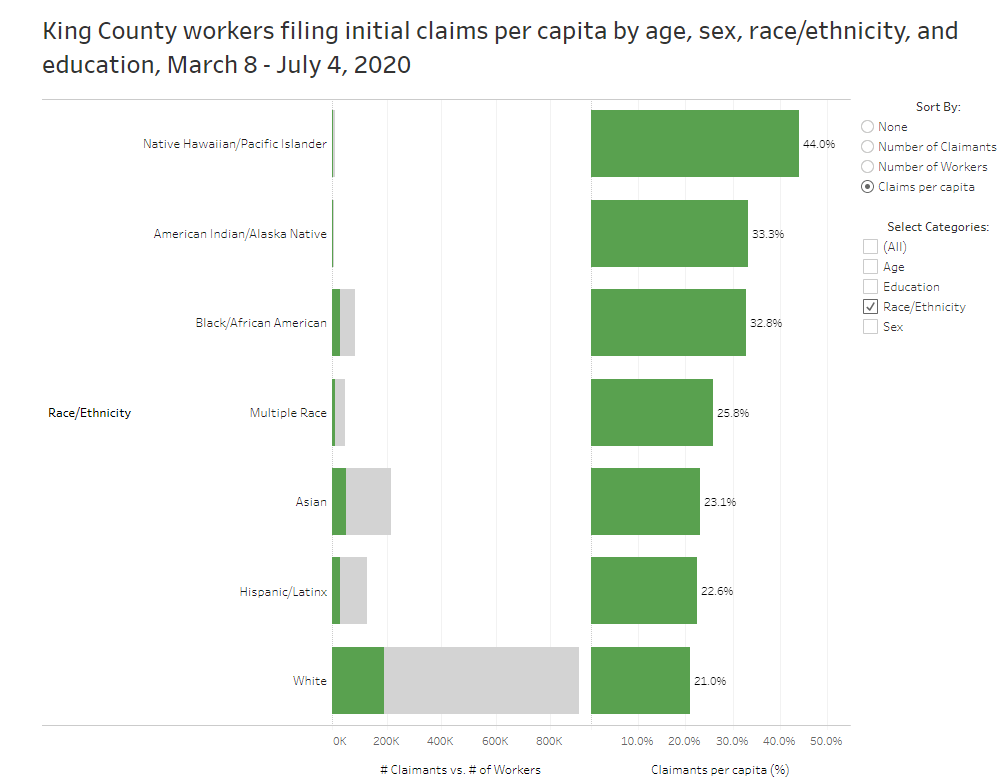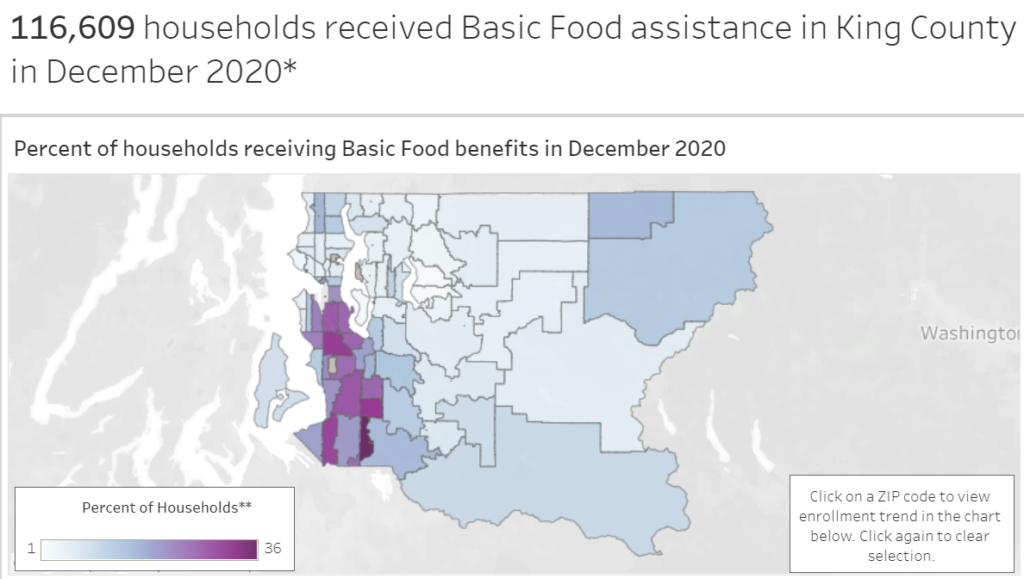The Diaper Need Crisis Continues In 2021: WestSide Baby Responds To An Increased Need Due To COVID-19 In King County
Basic Needs Gaps
Before the outbreak of COVID-19 in our community and the subsequent shutdown of businesses and community resources almost one year ago, we already knew that 21% of children in King County lived in families struggling with diaper need. We also know families are disproportionately impacted by diaper need:
Families are impacted by where they live:
– Families living in South King County, for example, are 9% more likely to experience diaper need than average in King County.
Families are impacted by race and racism:
– Compared to White families, families who identified as Native Hawaiian/Pacific Islander were 31% more likely to experience diaper need than White families, and Black families are 22% more likely to experience diaper need than White families.

Inequity based on the color of a child’s skin or their country of origin (or their parent’s country of origin) should not determine their health outcomes and providing basic needs will decrease the negative health outcomes associated with poverty and racism. This is the root of WestSide Baby’s mission and vision, and what guided our Rapid Response programming beginning April of 2020.
Negative Effects of Diaper Need
Diaper need is defined as the lack of a sufficient supply of diapers to keep a child safe, healthy, and dry. When babies are not able to be in a clean diaper, they experience negative physical health outcomes, such as diaper rash. When parents do not have enough diapers, their mental health struggles and they are not able to access childcare programs, forcing them to miss school or work. Finally, when social service providers, such as public health nurses, do not have diapers to supply to the families they support, they are unable to meet the needs of the family and are therefore unable to build the trust needed to meet the family’s goals.
Social and Economic Factors of COVID-19 in King County
New data released from Public Health Seattle & King County and the Washington State CORONA Study both shed light on a couple of important socio-economic and health factors related to the basic needs gap in King County. This data is important for understanding our community’s social and economic challenges resulting from strategies to slow the spread of COVID-19 since mid-March.
One major highlight is the impact of this crisis on families with young children:
34% of adults with children under 5 who said COVID-19 had an impact on their ability to afford basic needs, compared to just 21% of respondents without children.
Unemployment
King County residents filled 554,000+ unemployment claims from March 1 – December 1, 2020. In the first week of March, about 2,000 claims were filed, in comparison to 47,000 in the first week of April alone.

Race & Equity Data
There are obvious disparities in initial evaluation of the unemployment claims. 22% of all King County workers who self-reported as White filed a new unemployment claim during this time compared to 46% of Native Hawaiian/Pacific Islander workers, 35% of American Indian/Alaska Natives workers, and 34% of Black/African American workers.
More on this topic: Angela Garbes’s piece in NY Magazine
Impact for Basic Needs
More families are accessing public service support systems for the first time, leading to an increased demand for basic needs, such as diapers and wipes. WestSide Baby distributed 2.4 million diapers in 2020, compared to 1.5 million in 2019. Even as we move into 2021 and as King County moves “up” in reopening phases, our community will continue to need extra support for months to come.
WIC & Food Insecurity
7% more children were enrolled in the Supplemental Nutrition Program for Women, Infants, and Children (WIC) at Public Health-Seattle & King County clinics in April 2020 than in January 2020. Supplemental Nutrition Assistance Program (SNAP or “Basic Food Program” in Washington) enrollment was up to 116,609 households in December 2020 in King County compared to 98,068 households in February 2020.
Click here for King County’s Map of free food resources
Race & Equity Data
Southwest King County has seen a disproportionate amount of this increase in food insecurity. In the 98168 zip code, adjacent to our WestSide Baby Hub, 31% of all households were receiving SNAP Basic Food benefits in December 2020. This overlaps with the diaper need data mentioned above showing above average diaper need (over 30% of families) in South King County.
Impact for Basic Needs
Do not forget, WIC and SNAP do NOT allow for families to purchase diapers. However, WIC and other maternal support services through Public Health Seattle & King County, as well as Food Banks, represent a large number of our provider partner sites. We were grateful to increase our diaper distribution to all our partners in 2020 to attempt to meet the limitless need.
Additionally, we know that families needing a little extra support for groceries from WIC likely need support for diapers and hygiene products as well. National data from 2015 shows that families in the lowest income bracket spent 14% of their total income on diapers, with the richest bracket spending less than 1% on diapers.
Hoarding and Stockpiling
This crisis was doubled by distribution shortages of the basics, such as toilet paper, diapers, and wipes. Families shopping on a budget, at the beginning of the month, or after a paycheck, were unable to stockpile on necessary supplies when hoarding began (and continued) due to the COVID-19 outbreak. Even WestSide Baby struggled to find affordable options for wipes from our usual, discounted purchasing options, as the need for diapers and wipes from our partner providers continued to increase.
After surveying our partners in June of 2020, 90% said that diapers were their clients #1 most needed item right now. In our most recent survey in January 2021, 89% of our partners say this continues to be true. Many also mentioned items and necessities that WestSide Baby does not offer, such as grocery store gift cards, as high need items.
More on this topic: Read this article on Diaper Need in NY Times Parenting
In 2021, WestSide Baby will continue to distribute the most needed items as identified by our provider partners, and will continue to explore new, community access points, as we did in 2020, to work toward our vision of a day where very single child has their basic needs met.
Sources
- https://kingcounty.gov/depts/health/covid-19/data/impacts/corona.aspx
- https://www.kingcounty.gov/depts/community-human-services/initiatives/best-starts-for-kids/dashboards/bskhs-combined.aspx?shortname=Basic%20needs:%20diapers%20or%20formula
- https://www.thecut.com/article/covid-19-pandemic-women-at-work.html
https://www.cepr.net/the-hygiene-assistance-for-families-of-infants-and-toddlers-act-will-help-the-poor-pay-for-diapers/ - https://www.nytimes.com/2020/07/29/parenting/diaper-banks-formula-wipes-coronavirus.html

